|
Wet Cell & Maintanence Free Battery
Flooded: This is the
traditional engine start, tractor and deep cycle style battery. The
liquid electrolyte is free to move in the cell compartment.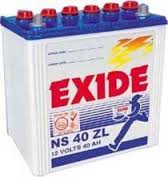 The user
has access to the individual cells and can add distilled water as
the battery dries out. Popular uses are engine starting and deep
cycle designs. The user
has access to the individual cells and can add distilled water as
the battery dries out. Popular uses are engine starting and deep
cycle designs.
Typical absorption voltage range 14.4 to 14.9 volts, typical float
voltage range 13.1 to 13.4 volts.
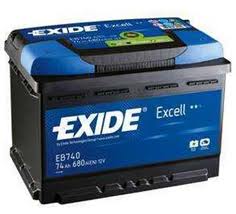 Maintenance
Free Battery Maintenance
Free Battery
Currently they are the most popular batteries
|
Seal Battery
Sealed: This term can refer to a
number of different constructions, including only a slight
modification to the flooded style. In that case, even though
the user does not have access to the cell compartments, the
internal structure is still basically the same as a flooded
battery. The only difference is that the manufacturer has
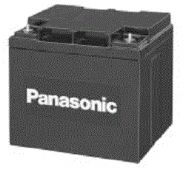 ensured that a sufficient amount of acid is the battery to
sustain the chemical reaction under normal use throughout the
battery warranty period. Very popular uses are
engine start and limited starting/deep cycle applications.
ensured that a sufficient amount of acid is the battery to
sustain the chemical reaction under normal use throughout the
battery warranty period. Very popular uses are
engine start and limited starting/deep cycle applications.
Typical absorption voltage range 14.2 to 14.7 volts, typical
float voltage range 13.1 to 13.4 volts.
|
VRLA Battery
VRLA:
This stands for Valve
Regulated Lead Acid battery. This is also a sealed battery.
The valve regulating mechanism allows for a safe escape of
hydrogen and oxygen gasses during charging. 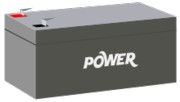
Typical absorption voltage range 14.2 to 14.5 volts, a typical
float voltage range 13.2 to 13.5 volts. Usually used in boats
or yachts.
What is CCA, CA, AH and RC? for battery?

Meet us
|
AGM Battery
AGM: The Absorbed Glass
Matt construction allows the electrolyte to be suspended in
close proximity with the plates active material. 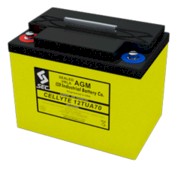 In theory, this
enhances both the discharge and recharge efficiency. Actually,
the AGM batteries are a variant of Sealed VRLA batteries, just a
more advanced design. Popular usage includes high performance
engine starting, power sports, deep cycle, solar and storage
battery.
In theory, this
enhances both the discharge and recharge efficiency. Actually,
the AGM batteries are a variant of Sealed VRLA batteries, just a
more advanced design. Popular usage includes high performance
engine starting, power sports, deep cycle, solar and storage
battery.
Typical absorption voltage range 14.4 to 15.0 volts, typical
float voltage range 13.2 to 13.8 volts.
Because of its Lead Calcium Design, the AGM battery will hold it
specific gravity more than three timeslonger than conventional
lead antimony battery.
|
|
Gel Battery
GEL:
The Gel cell is
similar to the AGM style because the electrolyte is suspended, but different
because technically the AGM battery is still considered to be a wet cell. The
electrolyte in a GEL cell has a silica additive that causes it to set up or
stiffen.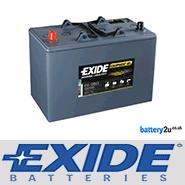 The recharge voltages on this type of cell are lower than the other
styles of lead acid battery. This is probably the most sensitive cell in terms
of adverse reactions to over-voltage charging. Gel Batteries are best used in
VERY DEEP cycle application and may last a bit longer in hot weather
applications. If the incorrect battery charger is used on a Gel Cell battery poor
performance and premature failure is certain. The recharge voltages on this type of cell are lower than the other
styles of lead acid battery. This is probably the most sensitive cell in terms
of adverse reactions to over-voltage charging. Gel Batteries are best used in
VERY DEEP cycle application and may last a bit longer in hot weather
applications. If the incorrect battery charger is used on a Gel Cell battery poor
performance and premature failure is certain.
Typical absorption voltage range 14.0 to 14.2 volts, typical float voltage
range 13.1 to 13.3 volts.
|
Li-ion Battery Lithium-ion
Battery is a member of rechargeable battery types in
which lithium ions move from negative electrode during
to positive electrode during discharge. Li-ion battery uses an
intercalated lithium compound as electrode material. The
biggest advantage in Lithium-ion battery is its has the
ability to be rapidly recharge which is exactly what's
required in hybrid driving. The power stored in the batteries
is easily tapped and readily available. Now it had been used
on Toyota hydrids car Li-ion battery uses an
intercalated lithium compound as electrode material. The
biggest advantage in Lithium-ion battery is its has the
ability to be rapidly recharge which is exactly what's
required in hybrid driving. The power stored in the batteries
is easily tapped and readily available. Now it had been used
on Toyota hydrids car Sudden
Battery Death
Why suddenly I could not crank to start up my Car
engine? There are 2 possibility.
1. Lights are
on while you lock your car or Parasitic Drain
2. Bad battery Cell
due to over heating or too high charging voltage causing the cell (lead plate to
wrap) to short
circuit/break down.
3. Faulty Alternator (charging System)
For Testing & Replacing your battery's condition: Visit Us
|
Measurement
of Electrolyte (Battery Water)
|
State of Charge
|
Specific Gravity
|
Voltage
|
|
|
|
12V
|
6V
|
|
100%
|
1.265
|
12.7
|
6.3
|
|
*75%
|
1.225
|
12.4
|
6.2
|
|
50%
|
1.190
|
12.2
|
6.1
|
|
25%
|
1.155
|
12.0
|
6.0
|
|
Discharged
|
1.120
|
11.9
|
6.0
|
.JPG)
Measurement of the Sulfuric acid (electrolyte) are by using hydrometer
|
Short
Battery Life Span
Parasitic drain is
a load put on a battery with the key off. Most vehicles have clocks, engine
management computers, alarm systems, etc. In the case of a boat you may have an
automatic bilge pump, radio, GPS, etc. These devices may all be operating
without the engine running. You may have parasitic loads caused by a short in
the electrical system. If you are always having dead battery problems most
likely the parasitic drain is excessive. The constant low or dead battery
caused by excessive parasitic energy drain will dramatically shorten battery
life.
Electronic Battery Condition check
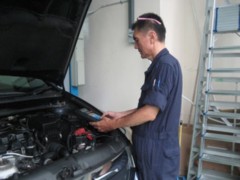
|





